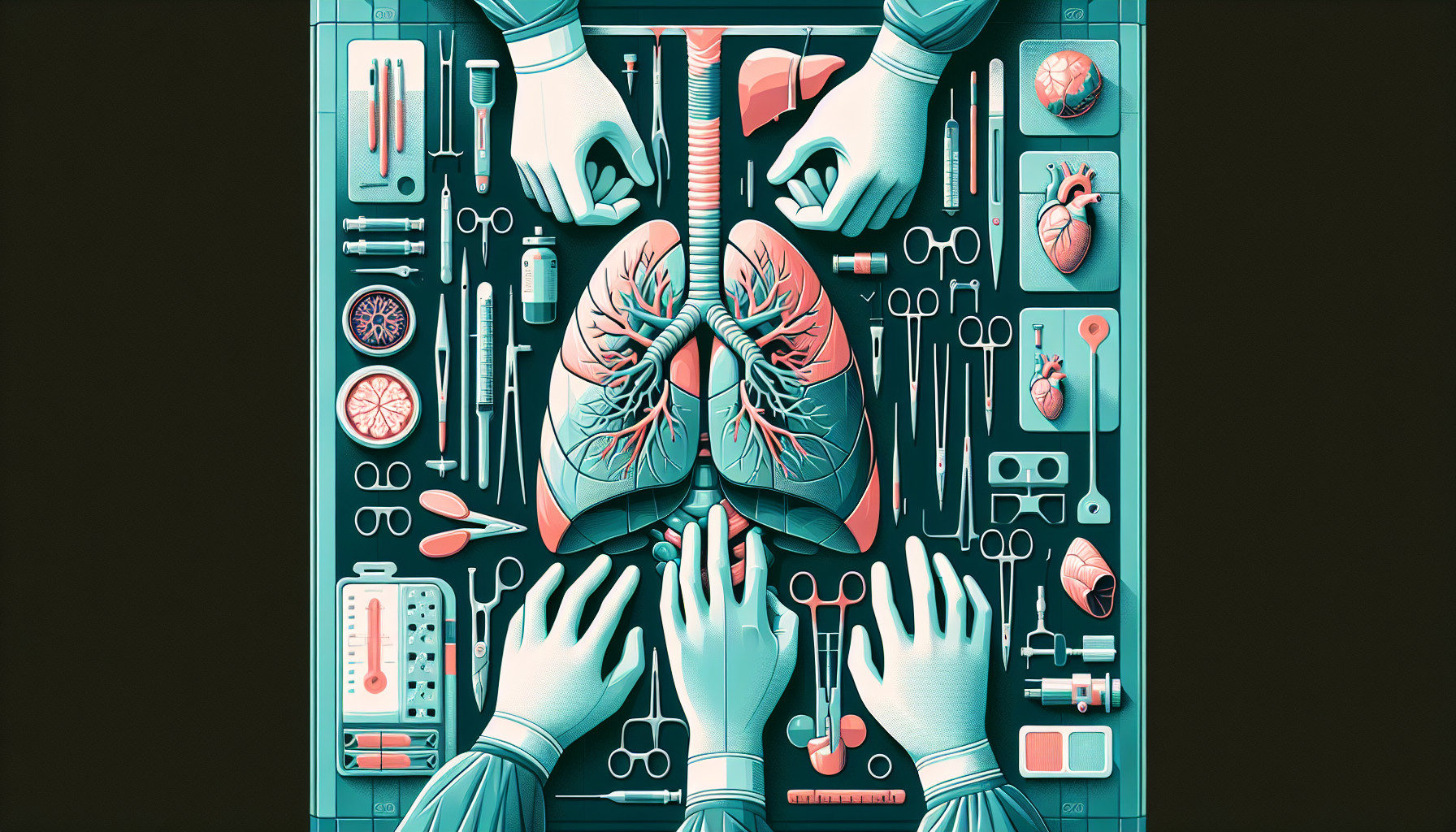Our Summary
This study looked at the presence of non-cancerous lung diseases in patients who were having surgery to remove tumors or other growths in their lungs. The authors studied medical scans and patient histories from 397 patients who had these surgeries between 2001 and 2015. They found that a quarter of these patients had other lung abnormalities, the most common of which were fibrotic interstitial changes (scarring in the lung tissue) and granulomatous processes (inflammation caused by infections or other diseases). They also found these abnormalities were more likely to be noted in the original pathology reports if they were written by lung specialists rather than general pathologists. The authors suggest that doctors should pay more attention to these additional findings, as they could affect how the patient’s disease is managed.
FAQs
- What was the main focus of the study about lung resection?
- What are the most common non-cancerous lung abnormalities found in patients undergoing lung resection?
- How might the findings of additional lung abnormalities affect the management of a patient’s disease?
Doctor’s Tip
One helpful tip a doctor might tell a patient about lung resection is to follow up with their healthcare provider regularly after the surgery to monitor for any potential complications or changes in the lungs. It is important to stay vigilant for any new symptoms or changes in lung function that may indicate a new issue developing. Additionally, maintaining a healthy lifestyle, including quitting smoking if applicable, can help improve overall lung health and reduce the risk of further complications.
Suitable For
Patients who are typically recommended for lung resection include those with:
Lung cancer: Lung resection is often recommended for patients with early-stage lung cancer to remove the tumor and prevent it from spreading.
Benign lung tumors: Patients with benign tumors in their lungs may also undergo lung resection to remove the growth and prevent complications.
Lung infections: In some cases, patients with severe or recurrent lung infections may be recommended for lung resection to remove the infected tissue and improve lung function.
Lung diseases: Patients with certain non-cancerous lung diseases, such as chronic obstructive pulmonary disease (COPD), bronchiectasis, or interstitial lung disease, may be recommended for lung resection to improve their breathing and quality of life.
Lung nodules: Patients with suspicious lung nodules that are at risk of being cancerous may undergo lung resection to remove the nodules and prevent the spread of cancer.
Overall, the decision to recommend lung resection is based on the specific condition of the patient and the potential benefits of surgery in improving their health and quality of life.
Timeline
- Before lung resection:
- Patient undergoes medical scans and tests to diagnose the lung abnormality.
- Patient consults with specialists to discuss treatment options.
- Surgery is scheduled and patient undergoes pre-operative preparations.
- Patient may need to undergo additional tests to ensure they are healthy enough for surgery.
- After lung resection:
- Patient undergoes surgery to remove the tumor or growth in the lung.
- Recovery period in the hospital, which may include pain management and monitoring for complications.
- Follow-up appointments with doctors to monitor recovery progress and address any concerns.
- Rehabilitation and physical therapy to help regain lung function and strength.
- Long-term follow-up to monitor for recurrence of the lung abnormality and to address any potential complications or new lung issues.
What to Ask Your Doctor
- What is the reason for the lung resection procedure?
- What are the potential risks and complications associated with lung resection?
- How will the lung resection affect my breathing and lung function?
- What is the expected recovery time after the lung resection surgery?
- Will I need any additional treatments or medications after the surgery?
- How will the presence of non-cancerous lung abnormalities, if any, impact my post-operative care and long-term health?
- Will I need any follow-up screenings or tests to monitor my lung health after the surgery?
- What is the success rate of lung resection surgery for my specific condition?
- Are there any lifestyle changes or precautions I should take after the surgery to improve my lung health?
- Do I need to see a specialist, such as a pulmonologist, for ongoing care after the lung resection?
Reference
Authors: Hung YP, Hunninghake GM, Miller ER, Putman R, Nishino M, Araki T, Hatabu H, Sholl LM, Vivero M. Journal: Hum Pathol. 2019 Apr;86:93-101. doi: 10.1016/j.humpath.2019.01.002. Epub 2019 Jan 15. PMID: 30658062
